Trump's Transition Team Is Tethered To Thievery (And Worse)
Howard Lutnick manages a huge pile of money for Tether, a sketchy offshore company whose name appears frequently in criminal indictments. He also just became co-chair of the Trump transition team.
Etienne Note: This article also appears in “Government”, Media and Academia Criminality Exposed, A digest of HUNDREDS and HUNDREDS of articles exposing and suggesting inter-generational organized crime's control of the "Government," Media and Academia by the Art of Liberty Foundation. You can view the other articles or subscribe on Telegram: https://t.me/Government_Scams
Howard Lutnick is perhaps best known as the CEO of Cantor Fitzgerald, a financial services company that up until the morning of September 11th, 2001 occupied the particularly inauspicious real estate at the tippy-top of 1 World Trade Center. Up until that morning Lutnick’s name was not well known outside of Wall St. circles. In the weeks that followed the public got to know him as the guy who stopped the paychecks of all his recently vaporized employees before the dust had even settled around the smoking crater that used to be two of the world’s tallest buildings1. Lutnick’s company’s action left the families of his employees without expected income just as they were grappling with the trauma of losing a loved one in a terrorist attack. I share that factoid not because it’s particularly germane to the topic we’ll be covering here but because it effectively sets the stage as far as what kind of person we’re talking about when we talk about Howard Lutnick.
These days Lutnick should be2 well known for managing “many” of the $118 billion3 dollars theoretically belonging to a company whose name appears in criminal indictments the world over. Pig butchering fraudsters, fentanyl traffickers, slave traders, Russian oligarchs, North Korean hackers, Hamas, and Hezbollah have all relied on the full faith and credit of this pile of money to ply their trade while skirting the laws created to prevent them from opening the kind of plain vanilla checking accounts the rest of us non-terrorists take for granted4.
The company whose money Lutnick is holding5 is named Tether. It is far and away the single most important company6 in the rolling tsunami of fraud and cringe sometimes called “the cryptocurrency market”.
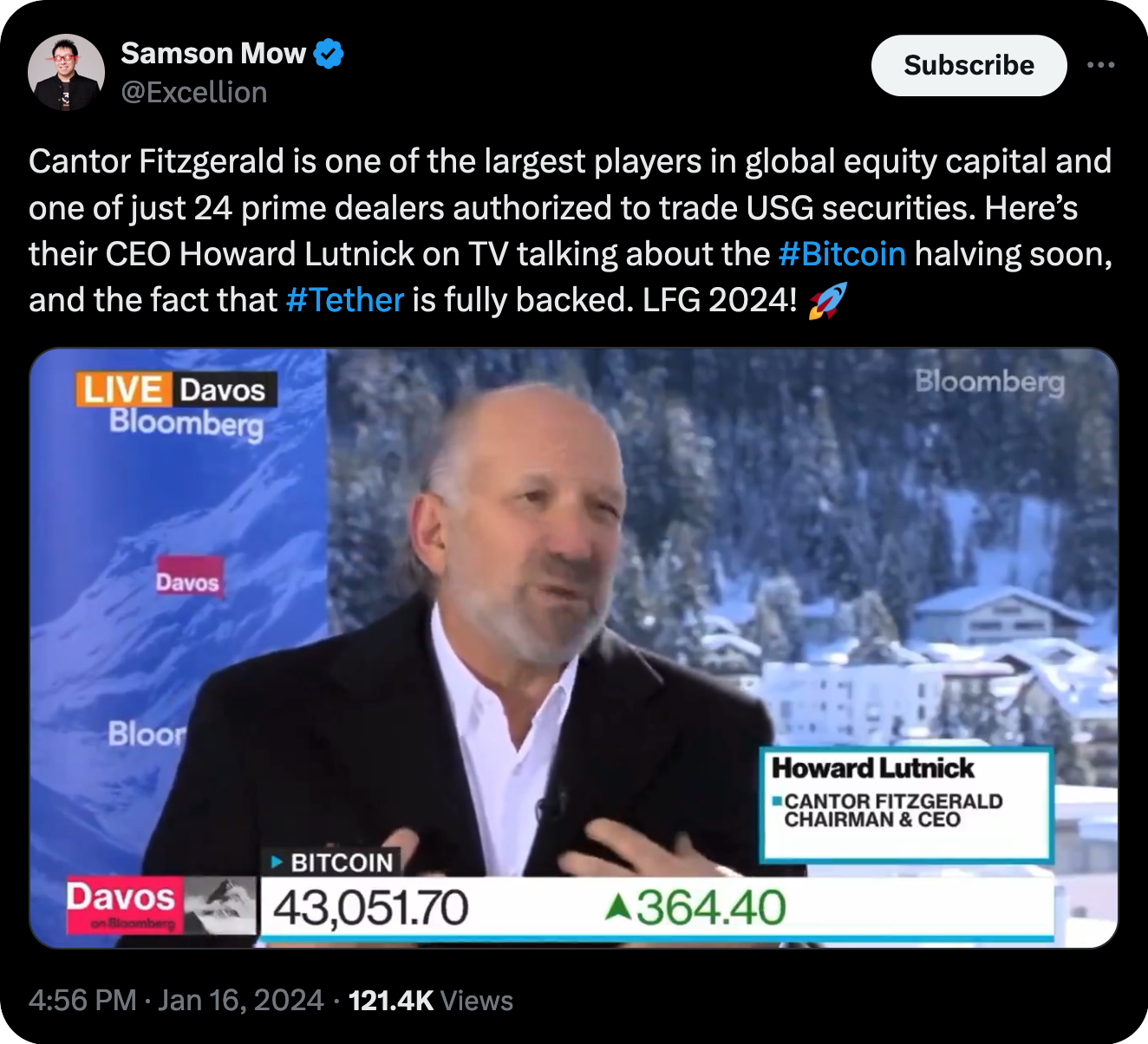
BANKING THE UNBANKABLE
What kind of company is Tether? Here’s a good mental model that will get you most of the way to understanding their business plan. Envision an enormous bank account that is simultaneously shared by every kind of criminal the world over. Think organized crime groups of many and varied ethnicities, drug cartels, terrorists, rogue nuclear states, money launderers, offshore casino operators, and so on7. Then:
Tether is the accounting system8 that enables this cast of supervillains9 to share the bank account, keeping track of who owns how much of the money in the account at any given time.
Howard Lutnick’s company Cantor Fitzgerald is the bank.
Tether makes money because this bank account earns interest. A whole lot of interest, paid directly by the United States Treasury into Tether’s pocket10, none of which is ever passed on to Tether’s customers (the people sharing the bank account) as would be expected in any normal financial operation that involved taking custody of customer money. By many metrics Tether is one of the most profitable companies in human history, often reporting more quarterly income than Goldman Sachs11. It would be reasonable to wonder whether these impressive profit margins are related to the fact that Tether’s name keeps showing up in criminal indictments all over the world, perhaps most noticeably in the American and Chinese court systems.

Anyways while that’s not exactly how the Cantor/Tether setup works - for instance Cantor is not technically a bank and what’s in the shared account isn’t cash but instead “cash equivalents” as well as gold, bitcoins, and worse - that’s a pretty reasonable way to think about it. In fact that’s the way Tether wants you to think about it. The slogan “banking the unbanked” is endlessly repeated both by their executive team as well as the crypto industry writ large.

Back to Howard Lutnick. In addition to his work as CEO of Cantor Fitzerald Lutnick has recently taken a keen interest in politics, holding at least one star-studded fundraiser for Donald Trump at his home in the Hamptons. This fundraising activity appears to have paid off handsomely seeing as how Lutnick was just appointed to be Co-Chair of the Trump transition team12, a title he shares with Linda McMahon from World Wrestling Entertainment (WWE13).
This article proposes that it would be reasonable for an American citizen to be Somewhat Concerned about the fact that a man who manages money for an offshore company which by all appearances seems designed more to avoid criminal prosecution than to serve its customers could well end up choosing who will be in charge of things like the Department of Justice and the armed forces if Donald Trump is reëlected14. And if you think this is just a partisan perspective I will note that even in our polarized times a large and diverse group of people from both sides of the political aisle15 agree that Tether’s role in international criminal finance is Very Concerning16. In fact skepticism about Tether has done wonders to bring people together from all sides of the political divide.
POKER FACED
So if Tether is an accounting system then how does it actually manage the accounts? A good mental model is that of a poker chip. Poker chips are, in their own way, an accounting system. When you enter a casino you give your money to the cashier in the cage. In exchange you are given poker chips along with the promise that you can bring those chips back to the cage and cash them in for real money at some time in the future. Your account balance in this system is the number of chips in your pocket. When you acquire more chips your balance increases, when you (inevitably) lose chips gambling your balance decreases, and if someone hits you in the face with a metal pipe and steals all your chips then your balance falls to zero.
This is a pretty good way to understand Tether’s token, usually referred to by the four letter symbol USDT17. In our simplified scenario USDT is the poker chips, Tether is the cashier where you buy those poker chips, the swarm of rigged gambling parlours that make up the cryptocurrency market is the casino18, and North Korea’s Lazarus Group is the metal pipe.
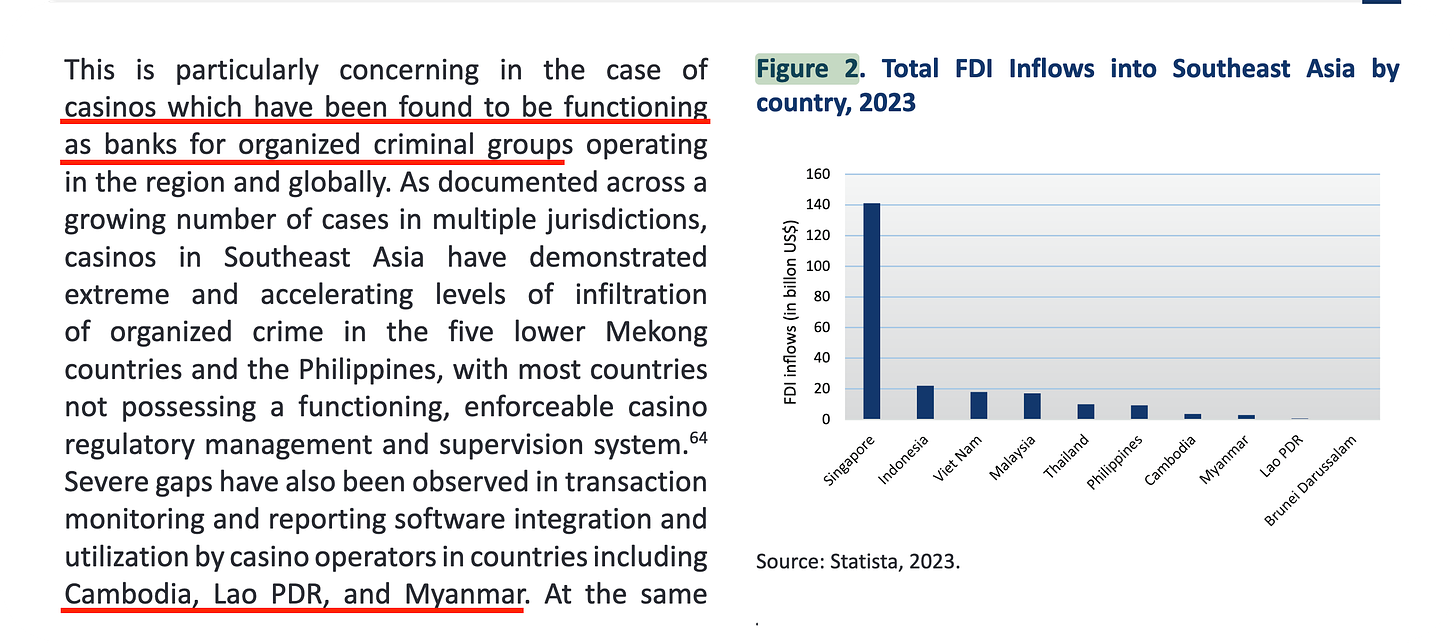
What specifically happens when you give Tether your U.S. dollars is that Tether takes those dollars and puts them in an account at Cantor Fitzgerald19. They then give you an equal amount of USDT “tokens” on a blockchain20 along with not-quite-a-promise21 that they will give you $1 for every USDT token you bring back to them in the future22.
[EXAMPLE]
If you give Tether $100 you will receive 100
USDTtokens.If you give Tether 100
USDTtokens they (almost) promise to give you $10023.
Once you have exchanged your real money into cryptocurrency you and your newly purchased USDT tokens are loosed into the Hobbesian jungle of international criminal finance. It’s a place where the life of your capital is likely to be nasty, brutish, and short, but if you can come up with a good enough scam or rob enough people you can get incredibly rich.
MULLAH MULLAH
It is worth noting that Tether is not the only poker chip vendor. It is, however, by far the biggest one, claiming to manage more than three times as many dollars24 as its only competitor of any size (a company named Circle)25. This size disparity may or may not be related to the fact that Circle is an American company that at least tries to create the illusion that it complies with existing financial regulations26. If you are the kind of cryptocurrency user who might be negatively impacted by that compliance - if, let’s say, you were an Iranian money launderer who was well known for violating the current sanctions regime imposed by the United States government, a sin which would get normal banks a corporate death sentence and the executives of those banks a trip to prison27 - you might prefer to just not go near anything that has even a whiff of legal compliance. Therefore you might always choose Tether when presented with a choice of poker chip vendors.
At least, if there theoretically was such a person.
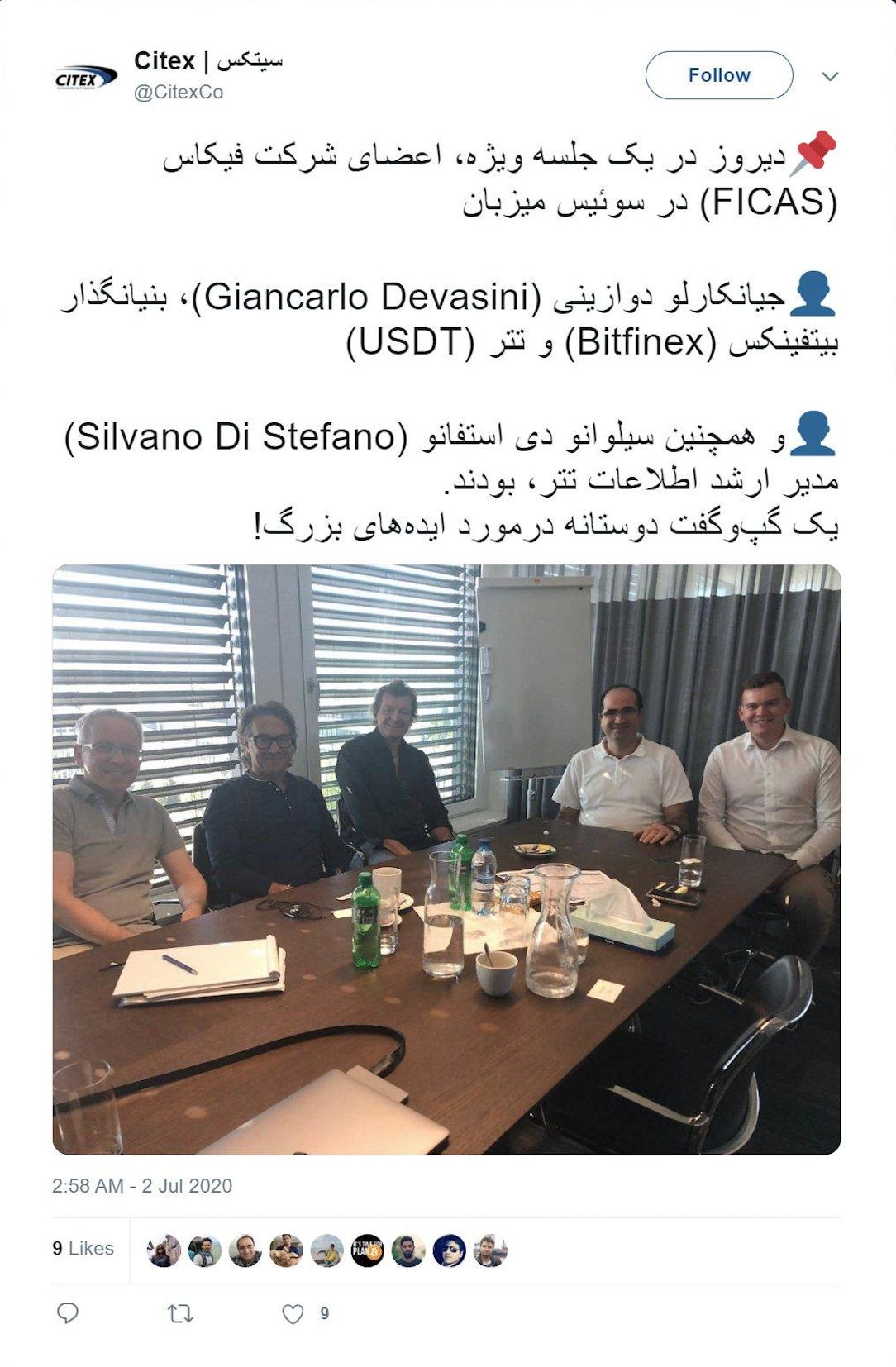
Or if you were, say, an Iranian cryptocurrency exchange allowing Iranians of all stripes to access dollar backed tokens you might also prefer some poker chip vendors over others. If such a company theoretically existed, at least.
Our IndieGoGo for my new book: Voluntaryism - How the Only “ISM” Fair for Everyone Leads to Harmony, Prosperity and Good Karma for All! has raised $1841 from 39 backers or 7% of our $25,000 goal in less than a week with 29 days left! You can get some great perks for pre-ordering at https://www.indiegogo.com/projects/voluntaryism-why-we-don-t-need-government






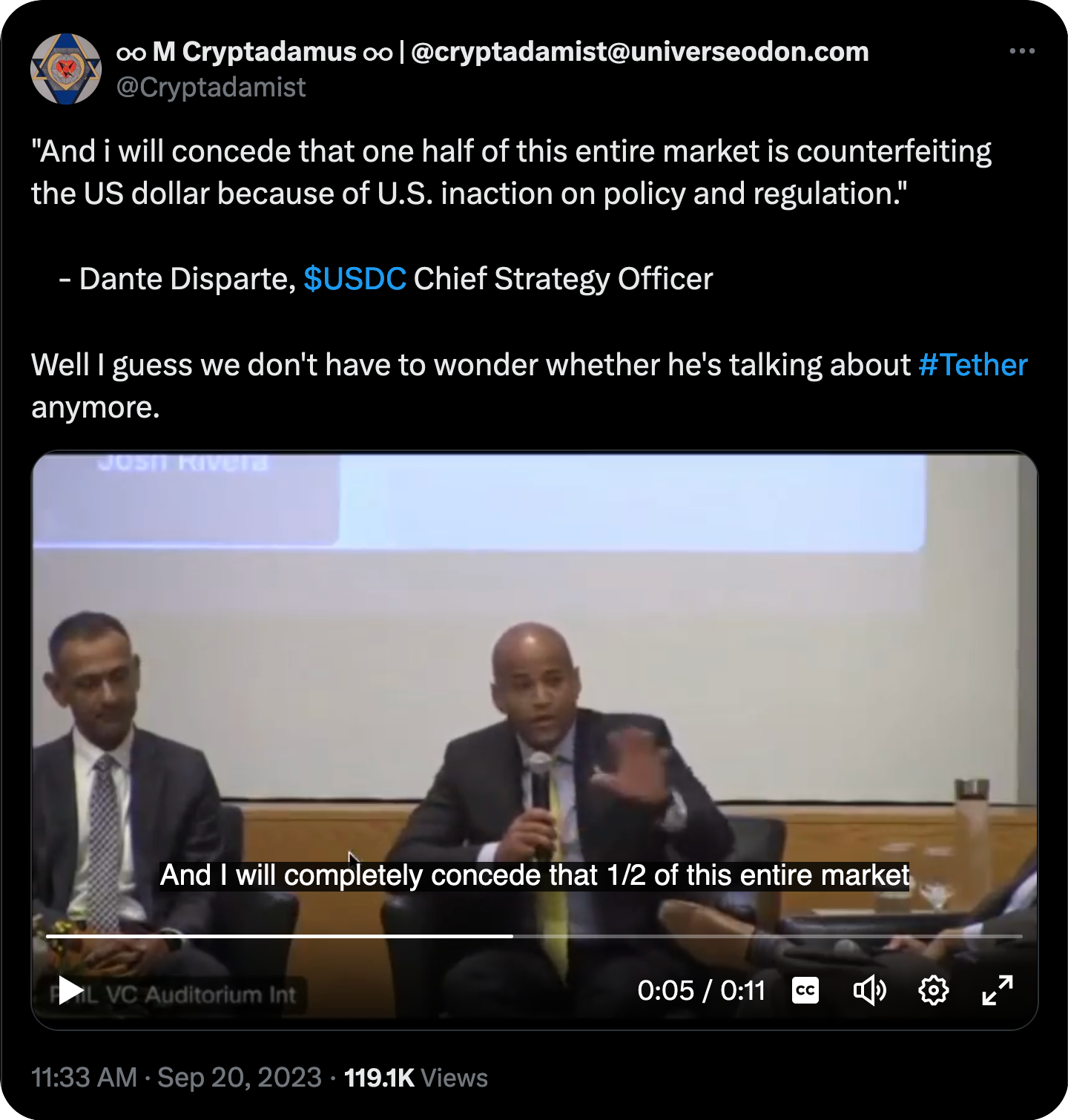

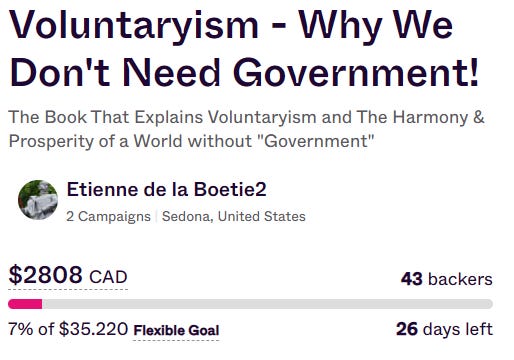
why did you republish my post without notifying me?